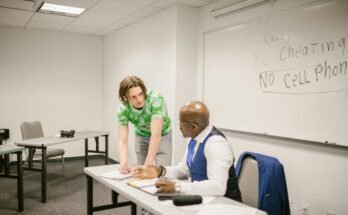Knowledge and wisdom are often spoken about in the same way, with the two words interchangeable in some cases; however, they are not exactly the same. Understanding the difference between knowledge and wisdom is more than just linguistics; it allows us to develop as a person. A whole new way of thinking helps us to make better decisions and lead a more fulfilling, purposeful life.
In this article we will define and categorize knowledge and wisdom, provide examples,discuss the differences between both knowledge and wisdom, and demonstrate why both are important to being successful, personally and professionally.
Definition of Knowledge vs. Definition of Wisdom
Knowledge is an accumulation of facts, information, and skills acquired by study, learning, or experience. It is what you know. For example, you know that water boils at 100°C.
Wisdom is the ability to apply that knowledge, with good judgment, to our real-world situations. It is knowing what is right or true and what will last. For example, if you know that drinking water is healthier than drinking soda and you do drink water instead of soda, that is wisdom.
👉 To summarize:
Knowledge = “what you know”
Wisdom = “how you use what you know”
Source of Knowledge vs. Source of Wisdom
Knowledge comes from third-party sources.
Acquisition of Knowledge and Wisdom
Knowledge is obtained fast through study, courses, and research.
Wisdom takes time, developed through years of decisions, making mistakes, and reflecting.
You can learn swimming from a book (knowledge) and practice the swim moves, develop capability, and move past any fear of water, you become wise in swimming.
How Knowledge and Wisdom Work for Decision-making
Knowledge helps you understand the options available to you.
Wisdom helps you decide which option is best overall in the long run.
Example;
Knowledge tells you how cheap junk food is.
Wisdom tells you that it is junk food and not to eat junk food every day, even if it is cheap and available.
Practical Capabilities
Knowledge is powerful in terms of study, occupation, professional development, and technology use.
Wisdom is powerful in executive leadership, relationships, and negotiation or compromise to resolve disputes.
A doctor may have knowledge about medical issues but if medical knowledge is not applied with wisdom, the doctor may ignore the human factor of empathy to a patient with medical issues. There has to be a combination of both medical knowledge and wisdom to create a capable doctor.
Emotional Intelligence and Human Behavior
Knowledge is based on reasoning, logic, and facts.
Wisdom is based on empathy, emotional intelligence, and human understanding.
Consider a manager in a company. A knowledgeable manager may know the company and employee policies but, a wise manager may know or recognize a situation when he/she need to adjust or relax policy in favour of employee welfare and company goodwill.
Emotional Intelligence and Human Behavior
Knowledge is about logic, reasoning, and facts.
Wisdom is about empathy, emotional intelligence, and human understanding.
A knowledgeable manager can understand a company’s policies, a wise manager knows when to be lenient and helpful to employees.
Timeframe: When They Develop
Knowledge can be developed at any age. Children learn facts through memorization.
Wisdom is usually acquired via age, maturity, and having lived it.
But age does necessarily confer wisdom without self-awareness to reflect.
Scenario Examples
Knowledge: Knowing that the speed limit is 60 mph.
Wisdom: Driving with caution due to impaired weather conditions despite no speeding.
Knowledge: Knowing smoking causes cancer.
Wisdom: Choosing to quit smoking regardless of the peer pressure surrounding them.
In these examples, it is clear that wisdom takes knowledge one step further into meaningful action.
Common Misconceptions
“Knowledge is always wisdom.”
Not so; one can have a knowledge of much but not make wise choices.
“Only people who are old are wise.”
Not so; while wisdom does come with age, a younger person can develop wisdom through effective reflection and lived experiences.
“Wisdom can never be taught.”
While wisdom cannot be taught in a classroom; it can be cultivated with certain forms of mentorship, reflection, and application of knowledge through lived experiences.
Knowledge and Wisdom Together



